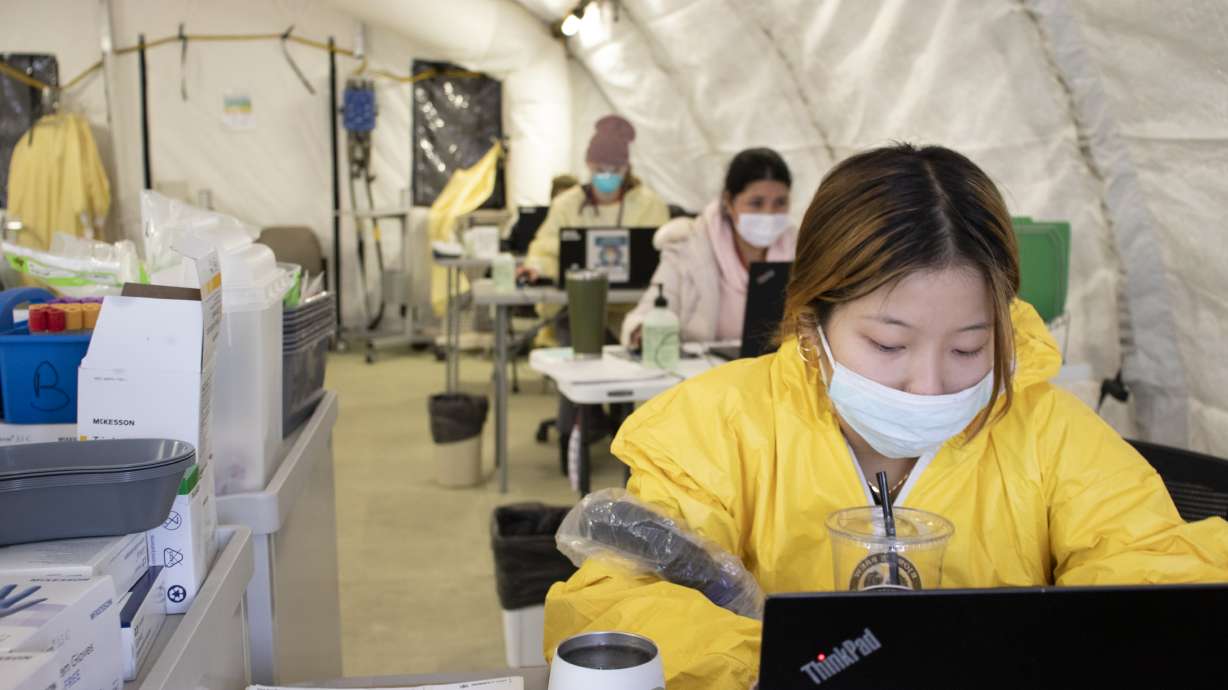Estimated read time: 4-5 minutes
This archived news story is available only for your personal, non-commercial use. Information in the story may be outdated or superseded by additional information. Reading or replaying the story in its archived form does not constitute a republication of the story.
SALT LAKE CITY — Intermountain Healthcare has donated $285,000 to Fourth Street Clinic to help fund its COVID-19 quarantine and isolation operations for the homeless community.
Fourth Street Clinic, a nonprofit organization that provides health care and support services to Utah's homeless population, began managing Salt Lake County's quarantine and isolation operations for the population in the summer of 2021. The clinic additionally partners and coordinates with other homeless resource providers and businesses to provide food, transportation and health care to those experiencing homelessness.
Since July, Fourth Street's quarantine and isolation program has served 561 individuals and families experiencing homelessness. Additional services provided by the clinic include COVID-19 testing and vaccination.
"We at Intermountain Healthcare really want to express our gratitude to Fourth Street Clinic who've for so long been a really vital service in our community providing assessable and high-quality health care to our most vulnerable community members," said Lisa Nichols, the assistant vice president of community health at Intermountain Healthcare. "That's a tough job and it's gotten even tougher during the pandemic, and particularly now as we're having really unprecedented surges."
The Fourth Street Clinic's quarantine operations are conducted in a rental space where COVID-19 positive individuals experiencing homelessness can stay for the isolation period. Clinic staff conduct regular medical check-ins to monitor COVID-19 symptoms of those individuals or families while they're in isolation. Currently, the space has 30 rooms available.
As the delta and omicron variants cause a surge in COVID-19 cases and hospitalizations, quarantine and isolation are vital to preventing additional outbreaks in congregate settings. Health care workers are feeling the strain as the seven-day average for new cases reached a new high of 10,679 per day on Wednesday.
"Someone who's not stably housed has the opportunity to have a safe, secure place to isolate during that time in which they're infectious. That supports the health of that individual, the community they're from, and really the broader community as we really make sure that we reduce exposure," Nichols said. "Health systems are stressed, they're taxed, we have a lot of people that we're caring for."
The shift by Salt Lake County to Fourth Street Clinic for quarantine and isolation operations came at a time when it seemed OK to scale back, Fourth Street Clinic CEO Janida Emerson said. Times have since changed.
"We've lived through delta and we're living through omicron now, and we have continued to see these increasing cases. That has put a huge amount of tax on us as a small community clinic to be able to do that," Emerson said.
Despite the considerable donation, the operations come with a hefty price tag of approximately $130,000 a month and Intermountain's donation will only fund a little over two months of the service.
"Funding has started to dry up. There was a huge influx of federal funding and state funding early on around COVID, but as now we head into, I guess, the second or third year of the pandemic, some of that funding has started to come a little bit more scarce," Emerson said.
In addition to financial woes, the homeless service sector is experiencing significant staff shortages that industries across the nation have grappled with.
"We, like all other health care providers, and are having staffing issues. We've lost a lot of our staff over the course of the last year to burnout, so being able to maintain the operations in a way that we know is going to maximize safety for both patients and staff is becoming increasingly challenging," Emerson said. "We are struggling right now with capacity in the homeless service system overall."
Procedures regarding capacity are further complicated by changing guidelines for isolation and COVID-19 protocols.
"Staff have been hearing one thing for a very, very long time; and now to kind of change those roles and have that be because of capacity issues, it just presents an additional barrier and additional stress on your staff," Emerson said. "How do you manage all of that without completely destroying your staff?"
Staffing shortages have delayed the opening of temporary winter overflow shelters. Utah homeless services coordinator Wayne Niederhauser said he's experienced the shortage firsthand as he and his staff have filled in for shifts at the Weigand Center. Niederhauser said that while getting temporary winter overflow shelters online is important, he's also working on long-term solutions.
To fund those solutions, Niederhauser has asked the Utah Legislature for $128 million. The funds will be used to provide approximately 2,000 to 2,500 new housing units statewide.
"We're hoping that providing a more noncongregate setting might interest some individuals to get into a place where they will begin to deal with the harm in their life and heal from most situations," Niederhauser said. "There are so many models out there that we've researched and that will make a huge difference. It won't solve all the problems because there's a lot of need, but this will be a huge first step."
And as the need grows Niederhauser hopes so will community engagement and partnerships.
"It is an all-hands-on-deck issue, the homelessness situation in our state, and it's going to take a partnership with the private sector and with our providers and with the government to advance and be more successful, improve lives," Niederhauser said.










